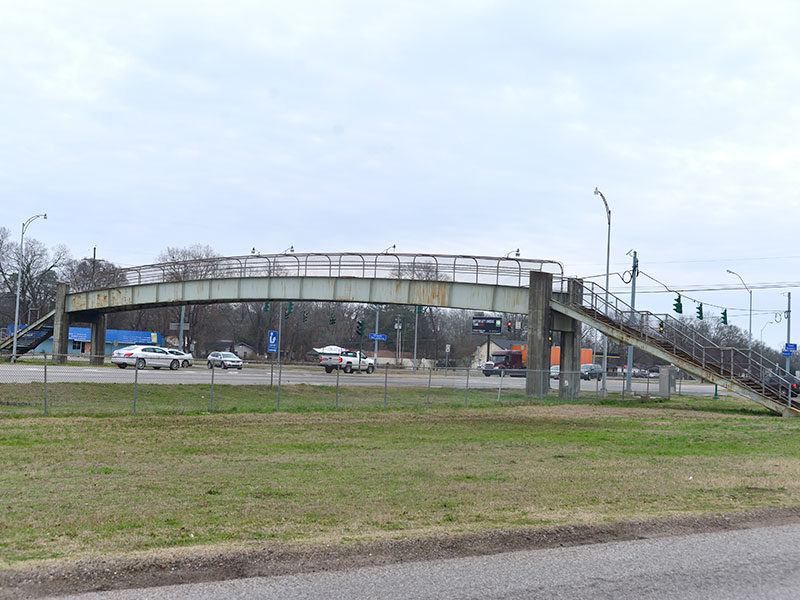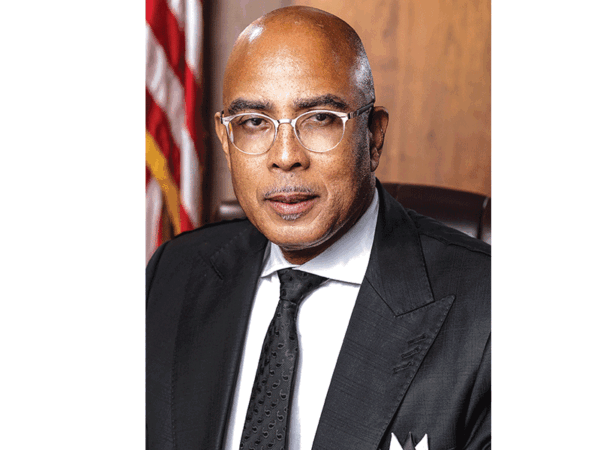Will spending up to $250,000 for a facelift to the Renwick Street overpass boost economic development in South Monroe? That was the main topic of discussion of the South Side Economic Development Board of Commissioners Monday.
Charles Theus, executive director of the SEDD, said plans are being made to spend between $150,000 and $250,000 to beautify the Renwick Street crosswalk as a part of SEDD’s overall plan to make the Renwick area more appealing to prospective businesses.
The solid steel crosswalk was constructed in the 1980’s to prevent pedestrian deaths as citizens try to cross the 165 highway. However, despite the crosswalk’s presence, most pedestrians do not use the crosswalk. Over the last 30 years, several persons have been killed trying to run across the highway instead of using the crosswalk.
Theus said SEDD will beautify the crosswalk with a canopy, stucco exterior and new lighting to help City Council woman Juanita Woods to have something to show in her district. He said SEDD monies will be used for infrastructure projects in all three South Side Districts.
Districts 4 and 5 have lighting and sidewalk projects along Winnsboro Road that will be funded by a 95% State Department of Transportation grant. However, because of budget restraints, there is no grant guarantee for District 3 so SEDD will probably foot most of the bill.
A team from ULM had also eyed beautifying the steel bridge which has begun to rust after three decades. Theus said he saw the ULM plans and trashed them. He presented architect renderings from Cedric Hemphill for the bridge renovation.
Hemphill told SEDD commissioners that since it planned more than just beautification, any alterations to the bridge would have to meet new state codes. He estimated the cost of the entire project to be between $150,000 and $250,000 depending on what extras the SEDD board wanted to add.
Whether face lifting a bridge that is seldom used would boost the economy for the South Side was a concern for several citizens present at the meeting. One man asked whether skilled workers who live in South Monroe would be used to complete the project and another asked whether beautifying the bridge would entice mostly youth to use it since many did not want to climb the steps with their bikes.
Hemphill said a spiraling ramp would make it easier for pedestrians to use the ramp but it would be an expensive undertaking. The board was allowed to look at architect renderings but were not given any copies to keep.
Theus said the bridge is needed because youth are being “slaughtered” trying to cross the 165 highway. He did not cite any statistics to support the claim.
In other business, the board received a report from its newly hired CPA, noting that it had $113,000 in the bank. No copies of the report were provided to board members.
In his report, Theus told the board about several meetings he has had with state officials to get state grant money for SEDD projects. He said Senator Francis Thompson told him that considering the governor’s budget cuts SEDD should not expect any funding this year. However, he said Representatives Katrina Jackson and Marcus Hunter told him to make budget requests and they would get the funding.
The board also discussed whether it was legal to make any decisions by text message. Board member Augusta Turner complained that some upcoming board meetings are being canceled because the chairman cannot be present and apparently the decisions were made by text since they were not made in open meeting. She said decisions by texting is illegal.
Theus said the texts, which he sent, were reminders of canceled meetings which were decided in the January meeting. There was no reference to canceled meetings in the minutes of the January meeting approved Monday night. Turner warned that the board could not meet by text message. She said meetings should be held “because we are about to start handling a lot of money” and if one member is absent then the next person in charge should handle the meeting instead of canceling once a month meetings.
During citizens participation, Marie Brown expressed a concern that the board rarely has anything in writing and seems to be operating in secret. She said Theus often reports about a list of people he meets with but there is seldom any written reports. She cited the lack of written finance reports for members or the public.
One board member said Brown only started coming to meetings in recent months and was suddenly interested in SEDD affairs. Brown said she and others worked the streets to help pass the hotel tax to fund SEDD she felt she and others concerned should not be kept in the dark about SEDD operations.
Theus warned Brown to be careful about anything she said about him in the public because she was not a public official and he had the capacity to sue her. However, a board approved executive director of a government entity, paid or unpaid, is considered a public official, according to the Louisiana Board of Ethics.
After the testy exchange, the board abruptly adjourned.




